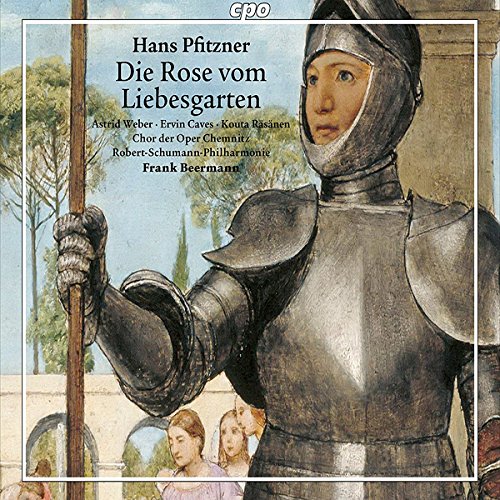PFITZNER Die Rose vom Liebesgarten
View record and artist detailsRecord and Artist Details
Composer or Director: Hans (Erich) Pfitzner
Genre:
Opera
Label: CPO
Magazine Review Date: 09/2017
Media Format: CD or Download
Media Runtime: 165
Mastering:
DDD
Catalogue Number: CPO777 500-2

Tracks:
| Composition | Artist Credit |
|---|---|
| (Die) Rose vom Liebesgarten |
Hans (Erich) Pfitzner, Composer
André Riemer, Der Moormann, Tenor Andreas Kindschuh, Der Sangesmeister, Baritone Astrid Weber, Minneleide, Soprano Chemnitz Childrens Opera Choir Chemnitz Opera Choir Erin Caves, Siegnot, Tenor Frank Beermann, Conductor Hans (Erich) Pfitzner, Composer Jana Büchner, Schwarzhilde, Soprano Kouta Räsänen, Der Waffenmeister; Der Nacht-Wunderer, Bass Robert Schumann Philharmonie Tiina Penttinn, Rotelse, Mezzo soprano |
Author: Andrew Mellor
Critics at the opera’s first performance in 1905 (facilitated and conducted by Mahler) liked the music but thought the libretto by Pfitzner’s university chum James Grun, to a scenario by the composer himself, laughable. Age hasn’t done it any favours. In truth, Pfitzner’s story (knight arrives in mysterious garden; knight sets out to find love; knight is destroyed by evil spells; knight is resurrected and reunited with his bride) isn’t a million miles away from Lohengrin with its fairy-tale and redemptive elements. So why does Der Rose von Liebesgarten prompt giggles instead of tears?
Most obviously because this was the 20th century. More importantly because Pfitzner is straitjacketed by his own diligent mindset. Die Rose von Liebesgarten doesn’t get down on its hands and knees like Humperdinck’s wonderful Königskinder (a comparable work in some ways), and, in the other direction, it doesn’t get close to the exaltation of any mature Wagner. That sense of mist and mystery in its near contemporary, Debussy’s Pelléas, is also missing. This isn’t just about ability or the aforementioned ‘charm’; it’s about understanding theatrical principles and explains why the composer had far more success with the drier subject matter of Palestrina.
In Die Rose, we have a great deal of inaction and monologue. The latter are often long and ponderous, but occasionally the music rises up (it never really ‘bubbles’ up) into climaxes that have varying degrees of transitional and theatrical conviction. Sadly, the final climax for the reunited lovers doesn’t deliver the goods regardless of which particular goods you’re after. There are some fascinating orchestral and harmonic effects, as noted by all three leading members of the Second Viennese School, who apparently discussed and quoted Pfitzner’s Prelude. Outside the confines of that opener and the various interludes, such effects can feel awkward.
Tremendous admiration for the musicians responsible for bringing all the 165 minutes of this until-now unavailable piece to the record shelves. Best of the singers is Erin Caves as Siegnot, whose sound Heldentenor credentials only serve to underline Pfitzner’s stylistic frustrations ‘after Wagner’. Astrid Weber as Minneleide has bags of vocal presence and a largely attractive dramatic soprano but is prone to bluster, particularly at the ends of phrases. Kouta Räsänen as the Master at Arms and the Night Sorcerer sings with moving nobility. The choirs can lack presence in the sound picture and the orchestra’s string tone is sometimes thin. Frank Beermann marshals his forces as effectively as can be expected. Proceed on a need-to-hear basis.
Discover the world's largest classical music catalogue with Presto Music.

Gramophone Digital Club
- Digital Edition
- Digital Archive
- Reviews Database
- Full website access
From £8.75 / month
Subscribe
Gramophone Full Club
- Print Edition
- Digital Edition
- Digital Archive
- Reviews Database
- Full website access
From £11.00 / month
Subscribe
If you are a library, university or other organisation that would be interested in an institutional subscription to Gramophone please click here for further information.




